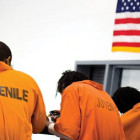
In the Wake of High Court Ruling, A Reprieve for Juvenile Lifers?
|
The U.S. Supreme Court’s recent decision banning mandatory life without parole for juvenile criminals gave inmates like Christine Lockheart a glimmer of hope. In response to the Court’s ruling, the Iowa Court of Appeals earlier this month overturned Lockheart’s mandatory life sentence for a murder committed when she was 17 and ordered a judge to hold a new sentencing hearing. But less than a week later, Iowa Gov. Terry Branstad commuted the sentences of all state prisoners serving mandatory life terms for crimes committed as juveniles, and instead gave them life with the possibility of parole after 60 years. Lockheart’s lawyer says he plans to challenge Branstad’s order in court, arguing that it violates the Supreme Court’s decision in Miller v. Alabama. That ruling said that sentencing judges should consider the individual circumstances of crimes committed by juveniles, including “how children are different, and how those differences counsel against irrevocably sentencing them to a lifetime in prison.”
Lockheart’s case is among the first of what criminal justice experts say will be numerous and lengthy legal battles as courts and state legislatures across the country determine how to comply with the Supreme Court’s ruling — and what to do with the estimated more than 2,000 prisoners currently serving mandatory life sentences for crimes committed when they were under the age of 18.








